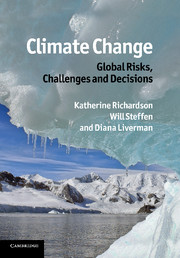Book contents
- Frontmatter
- Contents
- Writing team
- Foreword
- Preface
- List of acronyms and abbreviations
- Part I Climatic trends
- Part II Defining ‘dangerous climate change’
- Part III Equity issues
- Part IV Mitigation and adaptation approaches
- 11 Low-carbon energy technologies as mitigation approaches
- 12 Economic approaches and instruments
- 13 Geopolitics and governance
- 14 Adapting to the unavoidable
- Part V Meeting the challenge
- Index
- Plate section
- References
14 - Adapting to the unavoidable
Published online by Cambridge University Press: 04 April 2011
- Frontmatter
- Contents
- Writing team
- Foreword
- Preface
- List of acronyms and abbreviations
- Part I Climatic trends
- Part II Defining ‘dangerous climate change’
- Part III Equity issues
- Part IV Mitigation and adaptation approaches
- 11 Low-carbon energy technologies as mitigation approaches
- 12 Economic approaches and instruments
- 13 Geopolitics and governance
- 14 Adapting to the unavoidable
- Part V Meeting the challenge
- Index
- Plate section
- References
Summary
‘The people who are bearing the brunt of the effects of climate change are those who can least afford to do so and who have done least to cause the problem. Adaptation is both a practical need and a moral imperative.’
Climate change is a reality. Previous chapters in this volume have presented an up-to-date summary of the science of climate change, a description of some of the impacts that are already occurring, and an analysis of the risks that lie ahead as the climate continues to change. It is clear that even the most vigorous approaches to mitigation will not prevent a further escalation of the risks of climate change. Further impacts are unavoidable.
Adaptation to climate change is thus now considered essential in order to reduce the impacts of climate change that are already happening and to increase the resilience to future impacts, some of which cannot be reversed (Parry et al.,1998). Some countries have already started adaptation programs (Kabat et al., 2005; Swart et al., 2009). The IPCC started to address adaptation more comprehensively in a single chapter of its Third Assessment Report (McCarthy et al., 2001), while in its Fourth Assessment Report, adaptation attracted significant attention throughout the whole document (Parry et al., 2007). The shift from a focus primarily on mitigation towards embracing adaptation too can also be observed in the scientific literature (Figure 14.1), where adaptation and mitigation now get equal attention.
Information
- Type
- Chapter
- Information
- Climate Change: Global Risks, Challenges and Decisions , pp. 388 - 412Publisher: Cambridge University PressPrint publication year: 2011
